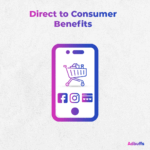Do you think the internet has eliminated the need for middlemen? We sure do. You compare Commerce 10 years ago to now. It’s completely different! Many brands have changed their business models, moving from traditional retail sales models to a Direct To Consumer/D2C marketing platform.
A Direct-to-Consumer or d2c marketing platform, in other words, is an e-commerce strategy that allows manufacturers to have complete control over creating, marketing, and selling products directly to consumers through digital channels. The D2C model is a better alternative to traditional retail which relies on wholesalers and distributors. The d2c marketing platform model takes out the middleman, allowing manufacturers more control over their brands.
This business model is disrupting traditional retail as it has several advantages over traditional retail strategies.
1. Direct selling of products and services to Customers.
The D2c marketing platform is able to bypass retailers and wholesalers and eliminate unnecessary costs associated with having intermediaries. It also helps maximize profits and lower costs by eliminating retailers’ sales commissions as well as display space fees. Specific targeting messages target only the people most likely to purchase a product or service. This involves tracking customer preferences over time in order to determine which information would convince a consumer make a purchase. Studies have shown about 88% of consumers would prefer to buy directly from the manufacturer, if they have the choice. Why? Because a d2c platform manufacturer offers not only expert service but also lower prices and customized products that can be tailored to customers’ needs.
2. Increased brand loyalty.
D2c marketing platform manufacturers have more autonomy in terms of providing their customers with better service and support with D2C. They can leverage their direct connection with consumers to establish strong relationships and drive retention through targeted marketing campaigns.
3. Direct access to customers and their data.
Direct contact with customers through every stage of the buying process (including post-sales) allows the collection of email addresses, location, social media profiles, purchasing preferences, and much more. d2c marketing manufacturers can optimize their products by learning consumer buying habits and, possibly, even create new product lines.
4. Higher Customer Lifetime Value
The customer lifetime value (CLV) is a measure of the customer’s relationship with your brand. A high CLV is a reflection of good profits. And Good profits are an indicator of a business that is healthy. Your CLV is bound to be lower when you have more middlemen because intermediaries take a slice of the profit. D2C allows brands to sell their products and services at the same price as retailers which positively impacts their bottom line.
5. Improved brand messaging control and consumer engagement.
The traditional manufacturer-retailer relationship leaves little autonomy for manufacturers to control their brand. Although they have some control over marketing and packaging, once the product has been handed to retailers, the manufacturer cannot influence sales, build relationships with consumers, or collect data. And even though manufacturers may spend a lot on advertising, ultimately it is the retailers that present the product to the consumer. The D2c marketing platform holds full control over pricing and customer data as well as messaging, product, reputation, brand, and product.
6. More opportunities to innovate.
Most retailers follow a particular set standard when it comes to selling. Many retailers are reluctant to sell products that aren’t well-known or have a track record of being “hot-sellers”. Manufacturers are thus limited and restricted to produce only what the retailers want. D2C marketing allows manufacturers to launch new products at a smaller scale, test with selected demographics, and collect feedback. This way, manufacturers can understand what their customers want, produce products or services that sells, and improve them as necessary.
7. Expanded market opportunities.
When selling via D2C marketing platforms, manufacturers are no longer limited by their geographic location. Businesses can go global by just selling to the right customers, in the right market.
Adopting a D2C strategy is beneficial from a financial and operational standpoint. It is always a good idea, however, to develop forward-looking plans in order to ensure that the model continues to deliver what consumers want. It is vital to constantly shake up the strategy in order to meet the ever-changing needs of consumers and to scale the business effectively into the future. In many ways, the direct-to-consumer model is as rewarding to customers as it is to manufacturers.










